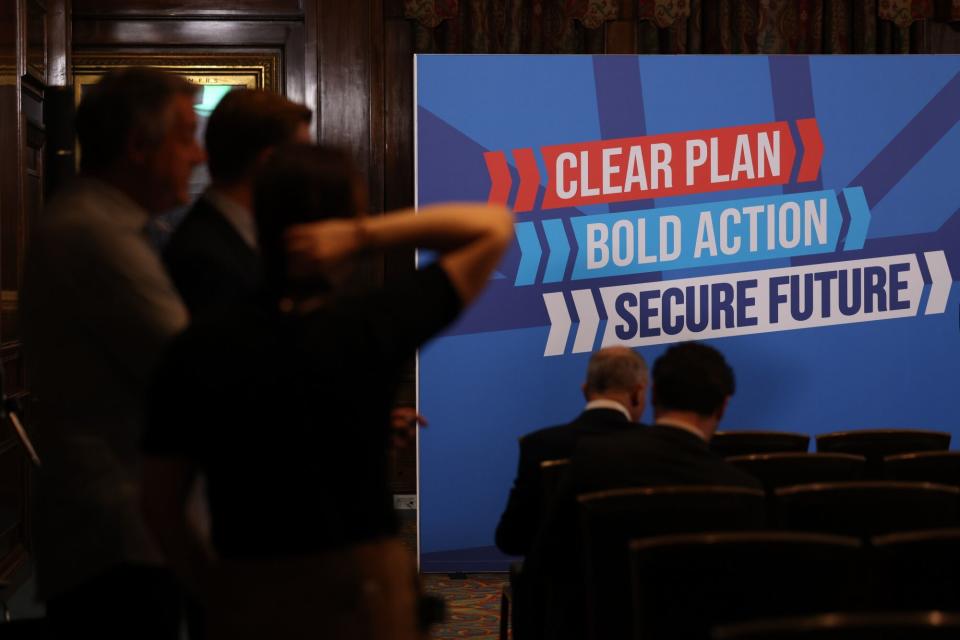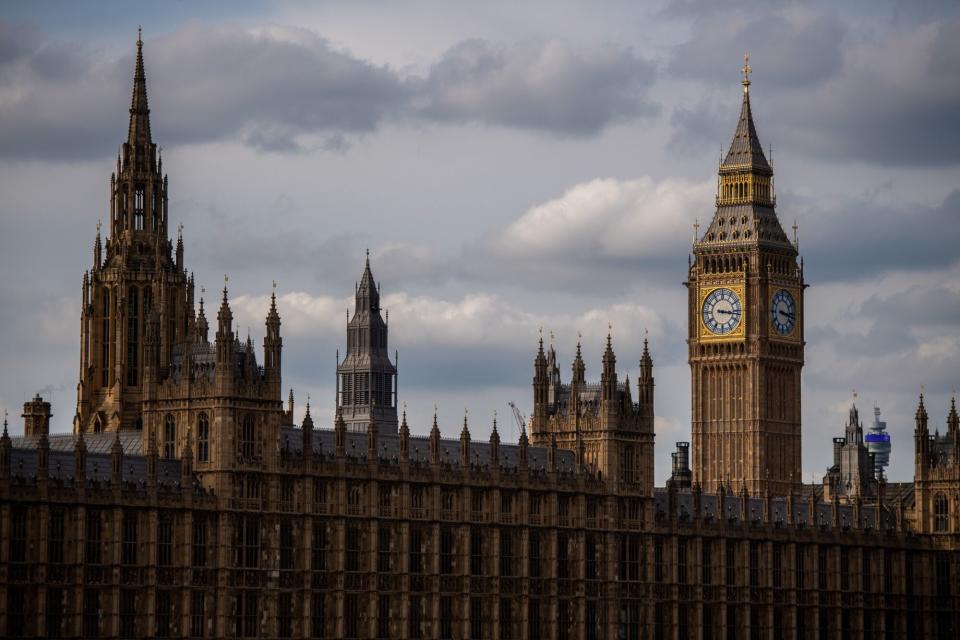Sunak’s Tories Fear Betting Scandal May Expand and Bury Them
(Bloomberg) -- Rishi Sunak’s chances of avoiding a landslide defeat in the UK election dwindled further as his Conservative Party battled revelations that several of the prime minister’s close aides placed bets on the date of the vote.
Most Read from Bloomberg
Nvidia’s 13% Stock Rout Has Traders Scouring Charts for Support
BuzzFeed Struggles to Sell Owner of Hit YouTube Show ‘Hot Ones’
Jain Global Raises $5.3 Billion, Secures Cash From Abu Dhabi
How Long Can High Rates Last? Bond Markets Say Maybe Forever
Tech Hits Stocks as Nvidia Extends Selloff to 13%: Markets Wrap
A Sunday Times report that a senior Conservative official made dozens of bets with bookmakers that Sunak would call a July election makes it four prominent Tories who have now been accused of trying to profit by gambling on its timing.
There are serious concerns at the top of Sunak’s party that other leading figures may be drawn into the affair with just 10 days to go until the election, people with knowledge of the matter said.
The scandal — dubbed “Gamblegate” in the British media — is threatening to dominate the remainder of the campaign at a time when Sunak’s Tories badly need to make up ground. Polls show Keir Starmer’s Labour Party is on course for an historic victory in the July 4 vote, while internal Tory analysis suggests the opposition party could win a parliamentary majority as high as 200 seats.
Craig Williams, a Tory candidate who acted as Sunak’s parliamentary aide, has admitted to betting on the election date shortly before the premier announced it. Since then, another candidate and two staff members at Conservative headquarters have been named in the media as having bet on the date. A police officer who worked in Sunak’s close protection team was also arrested on suspicion of misconduct in public office after allegedly betting on the timing.
Sunak said last week he was “incredibly angry,” but he’s facing intense criticism — including from within his Tory party — because he hasn’t suspended any of the accused Conservatives from their positions. The premier and his Cabinet are likely to face questions from reporters over the coming days about who else may have wagered on the election date, and whether any laws governing the use of inside information in gambling might have been broken.
The Gambling Commission said in a statement late Sunday it was “investigating the possibility of offenses concerning the date of the election.” It said its probe was “ongoing” and declined to name how many people it is looking into, or disclose their identities. The Conservative Party also declined to provide details, citing what it called the advice of the Gambling Commission.
The risk for the Tories is that at a moment in the political cycle when voters are already casting postal ballots and thinking more intensely about who to vote for on July 4, it’s the betting scandal that is dominating the headlines.
Speaking on Bloomberg TV on Monday, former Chancellor of the Exchequer Philip Hammond drew a parallel between the betting row and the so-called Partygate scandal involving former premier Boris Johnson and his aides breaking lockdown rules during the Covid pandemic. He said many voters made up their minds then they wanted a change of government, but that the betting scandal was a symptom of a failure of leadership at the top of the party.
“That’s when the rot set in,” Hammond said. “We’ve been gone through a period when the top leadership of the party has not sent strong enough signals about the requirement to comply with basic codes of ethics.”
Labour’s Pat McFadden wrote to the Gambling Commission on Sunday, calling on the regulator to name those it’s investigating. “The public will be rightly appalled that anyone close to the decision to call the election would use inside information to bet on an outcome they knew in advance,” he wrote.
Conservative Cabinet minister Chris Heaton-Harris, who is stepping down at the election, told LBC radio that the Tory candidates and officials named in media reports were “innocent until proven guilty” but conceded the timing was “not great” for his party with the election next week.
The story, which polling by YouGov suggests is cutting through to voters, comes as Sunak’s campaign team is ramping up its field operation to try to shore up the core Conservative vote in rural and southern England, a defensive move that appears aimed at reducing the scale of defeat to Labour.
On Monday, the Tories are expected to campaign against the clean-air policies of London Mayor Sadiq Khan in a bid to win votes from drivers. Labour, for its part, is reiterating its commitment to improve the provision of dentistry by the National Health Service.
Also on Monday, Business Secretary Kemi Badenoch and her would-be replacement, Labour’s Jonathan Reynolds, are taking part in a debate hosted by Bloomberg in London.
The Tory campaign will also hope to capitalize on a row over comments made by Nigel Farage, the Brexit campaigner whose right-wing Reform UK party’s surge in the polls is a key factor in predictions of a dire Tory election result.
In a BBC interview last week, Farage said the West “provoked” Russia’s war in Ukraine due to the expansion of NATO. In remarks to be aired on ITV on Monday, the he repeated the claim and called for negotiations to end the war.
Both major parties condemned Farage’s comments. Sunak said they were “completely wrong” and warned they played into the hands of Russian President Vladimir Putin. Starmer said Farage’s words were “disgraceful.”
--With assistance from Joe Mayes.
(Updates with Hammond comment in ninth paragraph.)
Most Read from Bloomberg Businessweek
How Jeff Yass Became One of the Most Influential Billionaires in the 2024 Election
Why BYD’s Wang Chuanfu Could Be China’s Version of Henry Ford
©2024 Bloomberg L.P.

 Yahoo News
Yahoo News 



